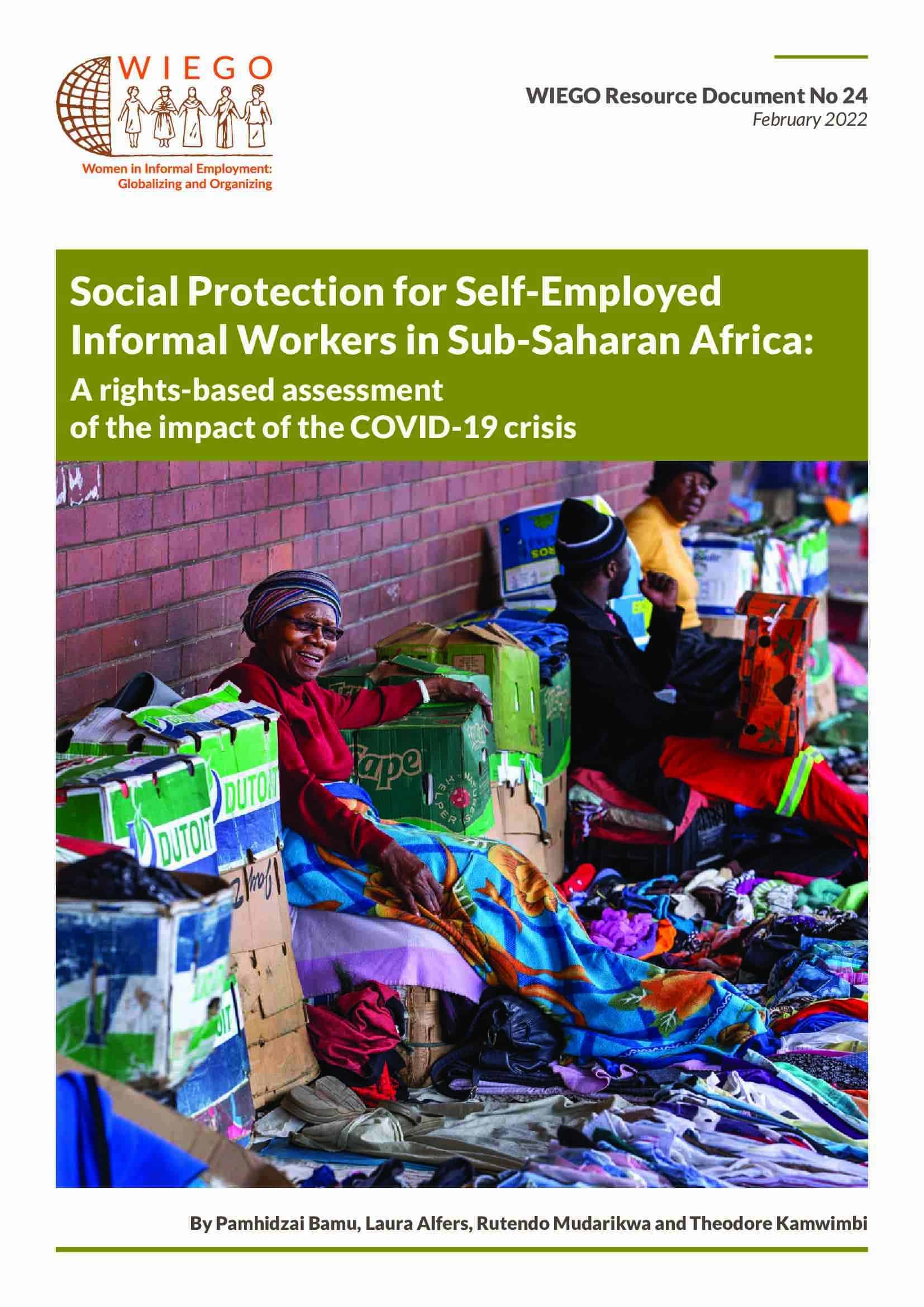Social Protection for Self-Employed Informal Workers in Sub-Saharan Africa: A rights-based assessment of the impact of the COVID-19 crisis
Key Points
- The rights-based approach to social protection implies that governments bear a duty to realize the right and are accountable for the actions they take towards this. Our overall assessment is that the surveyed African countries have not gone far enough to comply with their duty to extend social protection to self-employed workers, who account for a large proportion of the labour force in most countries.
- Shortcomings include the fact that constitutional commitments in many countries are not comprehensive enough to recognize the full ambit of the right to social protection. Contributory schemes only cover a limited range of benefits and few countries have adapted the modalities of their schemes to suit the needs of self-employed workers. Moreover, non-contributory social protection is embedded in policy rather than law and often excludes informal workers through eligibility criteria. There is limited provision for social dialogue in decision making through participation in governance structures for social protection.
- During 2020, several COVID-19 relief measures leveraged existing social-protection programmes in the surveyed countries. The overwhelming majority of those that reached self-employed informal workers leveraged social-assistance programmes rather than social-insurance programmes, highlighting the low level of coverage of the self-employed through contributory schemes.
- In Anglophone countries, relief measures provided for during 2020 were not codified in law, but relied on policy as expressed in press statements and addresses by Presidents or Ministers, cabinet decisions, circulars by ministers, or in response programmes and relief and recovery plans. This sits in contrast to the vast amount of legislation generated to regulate lockdowns.
- Informal workers’ organizations were largely excluded from national COVID-19 response decision-making structures, but they were able to influence governments by direct engagement, pressure tactics, and through trade unions. Trade unions seemed better able to articulate informal workers’ social-protection and relief needs than informal workers themselves, which suggests that social protection is still far removed from the lived realities of many informal workers.
- South Africa’s Mahlangu decision and the COVID-19 court cases in four countries (Malawi, South Africa, Uganda, Zimbabwe) point to the potential for litigation as a means of enforcing the right to social protection. It is possible for workers to litigate on social insurance to challenge the exclusion of self-employed workers and/or to demand adaptive measures to make it possible for them to participate in schemes. With social assistance, it may be possible to challenge the court’s eligibility criteria and call for universal social protection. We have pointed out the limitations arising in the context of socio-economic rights, particularly in relation to non-contributory forms of social protection. Notably, the challenges relating to the Francophone countries’ legal systems means that public interest litigation seems to be less viable in these countries.
- In addition to litigation in their national courts, informal workers’ organizations can consider approaching the Committee on Economic Social and Cultural Rights to file complaints against their governments if they have ratified the Convention. It may also be possible for an African organization (of lawyers/workers’ organizations) to approach the African Court of Human and Peoples’ Rights for an advisory non-binding opinion declaring that social-protection laws that exclude or do not adequately cover self-employed workers are incompatible with the rights in the existing binding instruments.
View list of all: Resource Documents

Citation Information
. Social Protection for Self-Employed Informal Workers in Sub-Saharan Africa: A rights-based assessment of the impact of the COVID-19 crisis. WIEGO Resource Document No. 24, , . WIEGO, 2022. https://www.wiego.org/wp-content/uploads/2022/03/rd-24-assesment-impact-covid-19-africa-2022_0.pdf. (2022). Social Protection for Self-Employed Informal Workers in Sub-Saharan Africa: A rights-based assessment of the impact of the COVID-19 crisis. WIEGO Resource Document No. 24, , . https://www.wiego.org/wp-content/uploads/2022/03/rd-24-assesment-impact-covid-19-africa-2022_0.pdf. "Social Protection for Self-Employed Informal Workers in Sub-Saharan Africa: A rights-based assessment of the impact of the COVID-19 crisis." WIEGO Resource Document No. 24, WIEGO, 2022, .. "Social Protection for Self-Employed Informal Workers in Sub-Saharan Africa: A rights-based assessment of the impact of the COVID-19 crisis." WIEGO Resource Document No. 24 (2022). https://www.wiego.org/wp-content/uploads/2022/03/rd-24-assesment-impact-covid-19-africa-2022_0.pdf 2022, 'Social Protection for Self-Employed Informal Workers in Sub-Saharan Africa: A rights-based assessment of the impact of the COVID-19 crisis', WIEGO Resource Document No. 24, , . https://www.wiego.org/wp-content/uploads/2022/03/rd-24-assesment-impact-covid-19-africa-2022_0.pdf, 'Social Protection for Self-Employed Informal Workers in Sub-Saharan Africa: A rights-based assessment of the impact of the COVID-19 crisis' (2022) WIEGO Resource Document No. 24 . Social Protection for Self-Employed Informal Workers in Sub-Saharan Africa: A rights-based assessment of the impact of the COVID-19 crisis. WIEGO Resource Document No. 24. 2022. https://www.wiego.org/wp-content/uploads/2022/03/rd-24-assesment-impact-covid-19-africa-2022_0.pdf. Social Protection for Self-Employed Informal Workers in Sub-Saharan Africa: A rights-based assessment of the impact of the COVID-19 crisis. WIEGO Resource Document No. 24. 2022. , . https://www.wiego.org/wp-content/uploads/2022/03/rd-24-assesment-impact-covid-19-africa-2022_0.pdf
